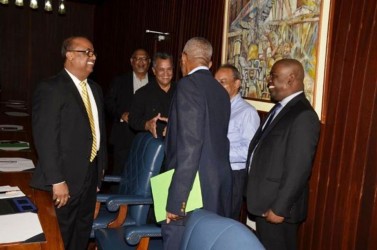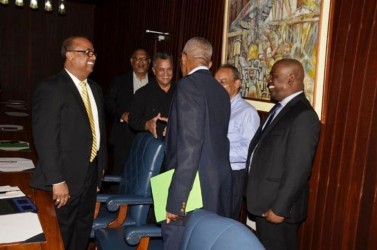The APNU+AFC government yesterday met with the Private Sector Commission (PSC) for the first time and both sides agreed to work towards a National Economic Forum where priorities could be distilled.
At the Ministry of the Presidency, President David Granger and his team met PSC Chairman Ramesh Persaud and his executives.
A release from the PSC said that the discussions covered topics ranging from legislative matters to the infrastructural needs of the country.
The PSC said that it emphasised the need for a reorganisation of the National Insurance Scheme and the Guyana Office for Investment as well as for telecoms liberalisation and tax reform.

It said that the urgent need for legislation to address money laundering, the financing of terrorism and the issue of bribery was reiterated.
The Commission also restated its support for a Public Procurement Commission and an Integrity Commission.
The PSC release said that the President was also presented by the Commission with a copy of the UK anti-bribery legislation for his consideration.
The business captains also cited the issue of high crime rates in the country which it said that President Granger has pledged to address. Solid waste management and improving tertiary institutions were also on the agenda.
The PSC release said that infrastructural needs of the country were discussed with the President in particular the need to expand the main airport and to attain Category One status for Guyana.
In opposition APNU and the AFC had various reservations about this project. The need for the dredging of the Demerara Channel was also raised.
The Commission also restated its backing for the Amaila Falls Hydroelectric Project and the completion of the Marriott Hotel. Both of these projects had met with various objections from APNU and the AFC. The Amaila project collapsed after APNU failed to support aspects of it in Parliament.
The new government’s plans to hold the long-awaited Local Government Elections were actively supported, the PSC added.
The private sector, consistent with its tradition of collaborating with government, said it pledged its continuing support for the government’s development agenda.
The PSC explained that through the Competitiveness Strategy, Public-Private Dialogue Bodies had been set up and provided a useful mechanism for guiding government policy and decision making. The PSC suggested that these could be reconstituted.
The Commission also said that it would be willing to collaborate with government to organise an Economic Forum at which priorities for the economy could be identified through dialogue. The President supported this suggestion and tasked the Commission to begin planning a Forum which would include the views of all stakeholders from civil society, the release said.








